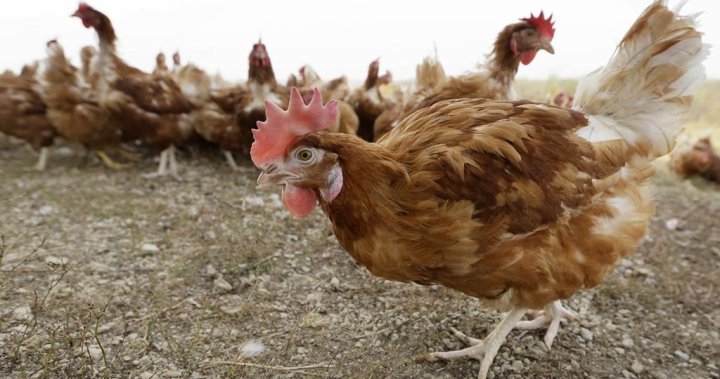The World Health Organization’s top scientist says there is “enormous concern” about the risk of spread of the H5N1 bird flu to humans, but at least one infectious disease expert says Canadians don’t need to worry about changing their daily routine just yet.
Speaking to reporters in Geneva on Thursday, Jeremy Farrar’s warning comes just two weeks after the U.S. Centers for Disease Control and Prevention (CDC) reported a human case of avian influenza in a person who had contact with dairy cows in Texas.
Avian flu, also known as bird flu, is caused by influenza viruses that spread among wild aquatic birds and can infect domestic poultry and other animal species.
The H5N1 avian influenza virus first emerged in southern China in 1996 and has been causing outbreaks in birds since then.
Numerous mammals have been infected over the years, but the recent addition of infection in dairy cattle raised concern among scientists both because it’s never spread to them before and due to the often-close proximity humans can have to these animals.
The Canadian Food Inspection Agency says no cases have been detected in dairy cattle or livestock in Canada, though producers are advised to monitor for signs and contact their veterinarian if they suspect a case.

“The great concern, of course, is that in doing so (spreading) and infecting ducks and chicken, but now increasingly mammals, that virus now evolves and develops the ability to infect humans, and then critically the ability to go from human-to-human transmission,” Farrar said.
The latest health and medical news
emailed to you every Sunday.
“This remains an enormous concern.”
Even with this concern, medical professionals like infectious diseases specialist Dr. Isaac Bogoch told Global News that the average Canadian does not need to be concerned at this time.
“What would you do differently in your day-to-day life? And the answer is nothing,” he said.
He said this flu has been “on the radar” for decades and the concern comes from seeing what he calls a “massive resurgence” of the virus among birds compared to previous years, resulting in large bird die-offs.
The issue, he notes, is as the virus potentially spreads from bird to bird and then bird to mammal, it can potentially increase its ability to mutate.

Since 2003, there have been a total of 889 human cases and 463 deaths caused by this strain of H5N1 reported globally, putting the case mortality rate at about 52 per cent as of April 1, according to the WHO.
Currently, Bogoch said the virus is not most efficiently transmitted between humans, but if it were to mutate, it could become more easily transmissible.
“It’s got epidemic and pandemic potential and it’s rather lethal. And we would never want something like that to take off in any species, let alone humans,” he said
It’s why both Bogoch and Farrar say the best way to tackle the concern around the virus is by ensuring countries have systems in place to detect H5N1 quickly to prevent spread, continuing current research and development of treatments like therapeutics and effective vaccines, and ensure communication internationally.
— with files from Global News’ Katie Dangerfield and Reuters
© 2024 Global News, a division of Corus Entertainment Inc.





